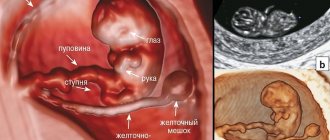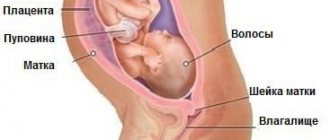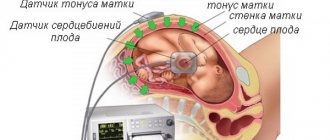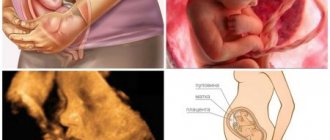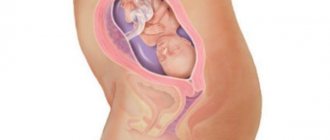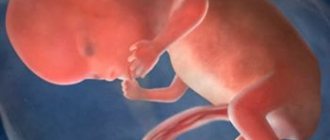Pregnancy 6 weeks. Symptoms
Reviews from expectant mothers are all different, it all depends on the characteristics of the body, but there are some similar points:
- lethargy;
- dizziness;
- fatigue;
- change of mood;
- small belly and others.
Pregnancy 6 weeks, the symptoms of which are listed above, is an important period in the life of your baby. Right now the heart begins to work, the brain is formed, eyes, legs, and arms develop. This is a very painstaking process; mother should avoid situations that are unpleasant for her in order to protect herself from the stress to which she is so susceptible. Now the expectant mother, as throughout her pregnancy, really needs support, care, attention and warmth.
An embryo at 6 weeks of pregnancy already causes a lot of inconvenience; serious hormonal changes occur in the expectant mother’s body, due to which sudden mood swings occur; dad should be patient.
Well-being and sensations of the expectant mother
Your appearance does not in any way reveal your position to others. You can also wear your favorite dresses and tight blouses. But frequent changes in behavior and reactions to familiar things will give you something to think about. So, what happens to women at 6 weeks of pregnancy?
The main factor influencing sudden mood swings is hormonal changes. Now your body produces large quantities of the hormone progesterone. It helps protect against various infections, strengthens the uterine mucosa, and ensures blood circulation to the fetus. This is why irritability and tearfulness arise.
The breasts become very sensitive, swell, and increase in size. The nipples are outlined by dark areolas. The size of the uterus gradually increases. It puts pressure on the bladder, causing frequent visits to the toilet. In the early stages, you will have to put up with a lot of unpleasant companions: toxicosis, vomiting, heartburn, constipation. Some experience a decrease in blood pressure, the appearance of acne, and skin problems. The condition of dry skin is normalized, but for those who suffered from excessive oily skin, problems may arise.
As for weight, some expectant mothers who suffer from toxicosis begin to lose a lot of weight. Others, on the contrary, are getting better. Slowing bowel function and enlarged uterus can affect slight growth of the abdomen.
The sense of smell is heightened, the woman picks up even the slightest odors that can cause discomfort. Taste preferences undergo serious changes. Just the sight of previously favorite foods can cause nausea. And vice versa - the food that you were indifferent to will become a must in your refrigerator.
You will have to come to terms with the fact that you may:
- motion sickness in transport;
- feel sick from any smell;
- vomit even from your favorite foods;
- fall asleep more often than usual.
You yourself are like a small child who easily gets upset even over the smallest thing. But he also simply calms down from ordinary manifestations of affection and care.
As already noted, this period is unsafe. More than ever, you need to listen to yourself.
Abdominal pain can be either absolutely harmless (pulling due to tension in the uterine ligaments) or fraught with danger. If he starts to get sick, and the peak of exacerbations occurs in the evening, you should go to the doctor. Slight brown discharge at 6 weeks of pregnancy is considered normal and should not cause concern. They usually appear in accordance with the menstrual cycle. Abundant bleeding, accompanied by pain, signals a miscarriage or frozen pregnancy. In any case, do not hesitate to contact an antenatal clinic to avoid unpleasant consequences.
Normal secretion of the mucous membrane will appear on the underwear as light or pinkish discharge in small quantities. There is no reason to worry.
There are also girls who tolerate the entire 9 months well, without noticing any unpleasant symptoms. These are purely individual processes that depend solely on the internal reserves of the body.
Changes
The 6-week-old embryo is still very tiny, but changes are occurring throughout the mother’s body. Even in such a short period of time, you can notice something new and unusual in a woman’s appearance. At the moment we are talking about the chest. It may swell, tingle a little, become rough, and the nipples and areolas begin to darken. This is a completely normal, common occurrence during pregnancy, do not rush to panic, if you are very worried about this, consult your doctor.
The same changes occur with the skin. Pimples and blackheads may appear, it loses its former elasticity, becoming a little porous. Proper skin care will correct this problem. Now is the time to start preventing stretch marks. Pay special attention to the chest, buttocks and abdomen.
Pregnancy 6 weeks. Photo
An ultrasound will not show much at this time. The baby's limbs and small eyes have not yet fully formed, which at this stage are very fragile, as they are just beginning their development. If you are 6 weeks pregnant, the fetus measures approximately 5 millimeters. He is very tiny, his heart does not yet have the shape of an adult’s heart, but looks like an ordinary tube, but with the help of some instruments you can already hear its beating.
Necessary tests and studies
The 6th week period is also notable for the fact that the woman meets with her gynecologist. Most often, this is the first visit during the current pregnancy. During this process, the woman is registered and management tactics for 10 obstetric months are developed. At this time, an assessment of the health status of the expectant mother and processes related to pregnancy occurs. The list of studies includes:
- Blood and urine tests (general), biochemical studies, and determination of blood glucose levels give an idea of the presence of diseases in a woman’s body that need to be treated.
- HCG (blood test). With its help, you can confirm the fact of pregnancy and judge the well-being of its course.
- AIDS, syphilis, hepatitis (blood test). The study is necessary to exclude serious diseases. If the results of the study reveal the presence of diseases, it is necessary to take them into account in the management of pregnancy.
- Determination of blood group and Rh factor. These studies are necessary for the timely detection of Rh-conflict pregnancy and the use of the necessary means for the birth of a healthy baby.
- Vaginal smear. Gives an idea of the processes occurring in the female genital organs.
- Ultrasound. The most interesting type of research for a woman. The baby’s heart is already beating, and the doctor can assess not only the number, location and size of the fetus, but also its heartbeat. It's very touching.
The given list of studies is mandatory. With its help, you can make the pregnancy as easy as possible and do everything to ensure that the baby is born healthy. This list of studies is not complete. Each pregnancy is different, and additional tests may be needed to diagnose your health.
Frozen pregnancy at 6 weeks
Despite the capabilities of modern medicine, there are situations when a pregnancy that has begun does not develop. In most cases, they are caused by genetic abnormalities of the fetus. If such a fetus continued to grow and develop, it could not lead to the birth of a full-fledged child. This mechanism allows us to reduce this possibility and protect a woman from carrying a sick child.
Ectopic pregnancy 6 weeks
A normal pregnancy develops within a special organ - the uterus. There conditions are created for the full growth of the fetus. Sometimes the fertilized egg does not have time to descend into the uterus, but attaches and begins to grow outside it. The fallopian tubes, abdominal cavity, ovary - all of them are not suitable for bearing a baby. Signs of this location of the fertilized egg may be pain on one side of the abdomen against the background of scanty bleeding or in its absence. When a pipe ruptures, the situation worsens sharply: intense, unbearable pain, nausea, vomiting, dizziness, and loss of consciousness appear. This is a life-threatening condition that requires immediate medical attention.
Features of urination
If you are 6 weeks pregnant, the size of the fetus (photo above) is still very small, but is already putting pressure on the bladder, which, in turn, can cause increased frequency of urination. Now the uterus has reached the size of a plum, the doctor will confirm the presence of pregnancy with one hundred percent certainty. Now is the time to choose a gynecologist as he will become your best friend during this time. As for urination, pay attention to the fact that there is no cutting sensation, as with cystitis. If you experience these symptoms, tell your doctor.
Mom's feelings
At this stage, the expectant mother already feels all the signs of early pregnancy. Morning sickness is very typical: weakness, nausea, possible vomiting. Very often women feel drowsy. Due to the increased content of progesterone, which causes relaxation of the internal muscles, problems with stool may begin. Therefore, a woman must include in her daily diet foods that help improve digestion, as well as maintain an adequate drinking regime.
Changes in the mammary glands are characteristic: enlargement, soreness, darkening of the areolas is possible, and a venous pattern appears. The uterus has grown somewhat and puts pressure on the bladder, so women notice frequent urination.
Painful sensations in the lower abdomen are possible, and if they occur, you should definitely consult a doctor to eliminate the risk of miscarriage.
The most characteristic symptoms are signs of early toxicosis. Normally, symptoms of toxicosis are observed until the end of the first trimester of pregnancy, but they can last longer. Their intensity is individual for all women, and quite often expectant mothers do not feel nausea or malaise at all.
A typical sign is also a change in taste preferences. A woman may crave foods that were not previously on her list of favorite foods. But nutrition should now be taken very seriously: the baby needs to receive all valuable nutrients, all harmful foods containing preservatives and dyes must be excluded from the menu, and alcohol should absolutely not be consumed.
Hormones
Thanks to the production of progesterone, the uterus does not contract, ensuring a normal pregnancy. At 6 weeks, the ultrasound photo won't show much, but you can keep the first photo of your baby as a souvenir. In addition to progesterone, the hormone chorionic gonadotropin, produced by the placenta, plays an important role. Your doctor should give you a referral to get tested quite often, checking your hormone levels. As for the norm, these indicators should increase, progesterone throughout pregnancy, and hCG during the first trimester.
The six-week-old embryo is still nourished and nourished by the yolk sac, which will soon disappear. Right now the baby's place is being formed and the umbilical cord is developing.
Fetal condition: what it looks like, what’s happening
At 4-6 weeks the baby is the size of a grain or a pea. Right now it is beginning to actively take shape. Yesterday's embryo has the contours of its body, arms, legs, and lower back. Every day he becomes more and more human. Bulges form on the head, which over time transform into eyes, ears, and a nose. One of the features is that it still has a “tail”, which later transforms into the lower part of the spinal column.
This period is considered one of the most important for the child - not only the birth occurs, but the “construction” of its internal organs and life support systems begins. And although it barely reaches 5 mm in size and weighs only 0.7-1 grams, its heart is already divided into two chambers, contracts and beats a clear rhythm of 140-150 beats per minute. Its work is controlled by a tiny brain. The heartbeat can be heard through an ultrasound machine. Education also begins:
- excretory, digestive, respiratory systems: the foundation is laid for the liver, pancreas, stomach, intestinal tubes, bronchi, lungs and larynx develop;
- cartilage tissue, from which bones, muscles, and tendons are subsequently formed;
- networks of blood vessels;
- central nervous system (CNS);
- The thymus gland (thymus) is the most important organ of the human immune system.
At 6-7 weeks of pregnancy, the neural tube has completely tightened, and nerve cells begin to actively divide. Erythrocytes - red blood cells - appeared.
The baby makes his first movements, although they are still imperceptible to the expectant mother. Real tremors will be felt no earlier than 18 weeks. With the help of the umbilical cord, he moves freely, or rather, floats in the amniotic fluid, the volume of which at this stage does not exceed 3 milliliters. In addition, along with the development of muscle tissue, a reaction to external stimuli begins and vibrations occurring in the fetal bladder are perceived.
A child at 6 weeks of pregnancy is very vulnerable to any influences and factors. The risk of miscarriage remains high, reaching almost 20%. Therefore, you must strictly follow the recommendations received from your doctor.
Changes in the baby
If the pregnancy is 6 weeks old, an ultrasound photo of the embryo shows us a still incomprehensible individual, similar to the letter C. At this stage, it is very important for the mother to take folic acid, it helps in hematopoiesis and the transmission of hereditary characteristics.
The baby develops the first blood vessels, the beginnings of a nose, mouth, and ears. Cartilage is formed, which will later become bones. The brain is two balls; in the end there will be two hemispheres. Now the baby is making the first movements, but imperceptible to the mother. If you are 6 weeks pregnant, the fetus measures approximately five grams and is one centimeter long. Such a tiny thing, but already an almost formed organism. Now cells are actively dividing and all vital organs are being formed. Mom should now protect herself from negative environmental factors that can harm the child.
Infectious diseases and bad habits
The first 6 weeks are the most important in embryonic development, since it is at this time that the organs and systems of the fetus are formed. At this stage, a pregnant woman should carefully monitor her well-being, since the health of her baby will depend on it.
ARVI in the 6th week of pregnancy is extremely dangerous , so only with the help of competent treatment from a specialist can you avoid serious complications that can lead to miscarriage and miscarriage.
You cannot treat a cold on your own, since antibiotics at 6 weeks of pregnancy, like herbal medicine, can harm the baby. Poisoning also poses a great danger at this time, because harmful substances released during intoxication are transmitted to the fetus, which can greatly harm it.
Substances dangerous to the embryo are contained in cigarettes and strong drinks, so drinking alcohol at 6 weeks of pregnancy and smoking also negatively affect the gestation of the fetus.
By preventing or completely avoiding these dangers in time, you can protect yourself and the developing fetus from serious problems that do not always end well.
Pain
Take abdominal pain very seriously, it can mean a possible miscarriage, especially if accompanied by bloody discharge. Also, abdominal pain may be less noticeable and cramping, which is quite normal in this position. Contact your doctor to rule out any possible threats to you and your baby.
Often expectant mothers suffer from lower back pain; they, as in the first case, can be safe, but can indicate possible infections that have a detrimental effect on the future health and development of the child.
In any case, the cause of the pain should be determined by a specialist; do not risk your health and the life of your baby.
Vaginal discharge
There are several types of discharge during pregnancy. They can be scanty transparent or whitish, abundant white curdled, or have a yellow, brown, greenish tint.
If your discharge does not have an unpleasant odor, it is whitish in color, then there is no need to worry, this is a completely normal reaction of the body to changes in the hormonal levels of a pregnant woman.
You should pay attention to leucorrhoea, which has a cheesy consistency, causes itching, swelling of the mucous membrane, and has an unpleasant odor. Such discharge indicates the presence of a widespread infection. This is thrush or, as it is otherwise called, candidiasis. This disease is caused by a fungus called Candida.
Thrush does not cause any serious interference with the course of pregnancy; one might say that it is generally harmless. However, consult a doctor and do not self-medicate. The drugs that you used before pregnancy to get rid of thrush may now be strictly prohibited for you. For example, douching is a very effective method of eliminating the disease, but during pregnancy, douching should be completely avoided.
Several other types of discharge that have an unpleasant odor and color, may resemble pus, and pose some danger to the unborn baby and the health of the mother. You probably have a sore throat. Colpitis, unlike thrush, is much more difficult to treat and can even become chronic. What danger does it pose to the baby? Infection of the fetus or amniotic fluid is possible, and colpitis can also cause pregnancy complications. The color and nature of the discharge depends on the pathogen.
Whatever discharge you notice, be sure to talk to your doctor, only he can help you get rid of the unpleasant sensations and smell.
Illness at 6 weeks of pregnancy
As mentioned earlier, the sixth week of pregnancy is a very serious period for the baby. Even a mild disease poses a threat to the life and health of the embryo. Let us note that during pregnancy, especially in the first trimester, the pregnant woman’s immunity is reduced, the body is susceptible to any infections, it is worth protecting yourself at this stage. But, despite the fact that many mothers are very fixated on their health, 90% still catch diseases, for many everything goes away without consequences, but you should not self-medicate.
Carelessly taken once, the drug can cause serious problems, including pregnancy failure, while a cold does not have such a strong effect on the baby’s health.
What should you do if you have a cold? Be sure to consult a doctor, he will tell you how best to proceed. It is very useful to drink rosehip decoction or green tea. Rinse your nose, but do not use regular drops. An ordinary saline solution (sodium chloride) will be a good helper with this; it costs a penny and is available in every pharmacy.
Eat more foods rich in vitamin C, breathe fresh air, then the cold will subside.
Main features
For many women, the 6th week becomes a kind of “milestone” that divides their life into “before” and “after”. The fact is that this is the period at which many expectant mothers find out about their situation. At the same time, clear signs of impending motherhood appear, that is, the sensations are already real.
One of the most significant signs is the absence of menstruation, however, many people also experience other sensations. What sensations appear during this period? Unfortunately, not too pleasant. This is the period when toxicosis may begin to appear. Many expectant mothers complain about:
- lack of strength;
- causeless fatigue;
- dizziness;
- changes in emotional background.
Advice! The husband and other relatives should know that this behavior of a pregnant woman is the norm. The consolation is that such changes in character are not permanent, after a while everything will return to normal.
Toxicosis
Among the most common signs of pregnancy at this stage are changes in tastes. A “classic” sensation is when a pregnant woman is constantly craving something “salty.” However, changes in tastes may vary from person to person. Some people stop accepting meat food normally, others are drawn to sweets.
All these are signs that toxicosis has begun to appear. This is a very unpleasant condition, however, mild toxicosis in the early stages is the norm, there is no harm in it for the child.
You just need to be patient a little, the toxicosis will go away after a while and your health will improve. How long will you have to endure? It depends on the characteristics of your body. Most often, mild toxicosis manifests itself as nausea in the morning.
If toxicosis has pronounced symptoms, that is, it is manifested by repeated vomiting during the day and a sharp deterioration in well-being, you do not need to endure it! Severe toxicosis not only exhausts the expectant mother, but is also harmful to the unborn child. In this case, the body becomes dehydrated, and this circumstance negatively affects the provision of nutrients to the fetus.
Therefore, if toxicosis is manifested by frequent vomiting, you should definitely consult a gynecologist. Today, there are various treatment options that will make toxicosis easier, severe symptoms will go away and the expectant mother will be able to enjoy pregnancy.
Mammary gland
The pregnant breast undergoes serious changes during this period. The breasts begin to prepare for feeding the baby from the moment of conception, but it is from 6 weeks that the breasts begin to change noticeably.
The chest becomes tense and noticeably increases in volume. Many women during this period complain that their breasts are noticeably sore, and their nipples become especially sensitive. The changes that the breasts undergo may resemble the condition of the mammary glands during PMS. However, in pregnant women, the breasts change more significantly.
In addition to swelling and the appearance of moderate pain, other symptoms may also appear. So, a noticeable “mesh” of veins may appear near the nipple, and the nipple halo itself darkens. Sometimes small discharge of colostrum appears from the nipple; do not be alarmed by slight discharge during this period - this is the norm, the breast is simply preparing for the period of feeding the baby.
If the breasts not only become painful and tense, but lumps appear in the mammary glands or bloody discharge from the nipple is noticed, then you should consult a doctor. Perhaps there is nothing wrong with these symptoms, but it is better to be safe and get examined.
Analyzes
One of the main tests at this stage is to determine the hCG level. This is a special hormone that begins to be produced after a fertilized egg enters the uterus. The presence of hCG in the blood and urine determines the presence of pregnancy. You can donate blood for hCG even before the delay, but the level of hCG in the urine begins to rise later.
Advice! It is on measuring the level of hCG in urine that the action of pregnancy tests is based. If hCG is present, a second line appears on the test.
It is necessary to donate blood for hCG at this stage in order to ensure the normal course of pregnancy. During this period, the level of hCG increases rapidly and it is by the degree of increase in the level of hCG that the doctor determines how successfully the development of the embryo occurs. The hCG level in the sixth week is in the range of 50,000 - 200,000.
Advice! Different laboratories may use different research methods, so the level of hormone content may vary.
Ultrasound
During the examination, an ultrasound may be prescribed at 6 weeks of pregnancy. At this stage, an ultrasound can determine the presence of a fetus in the uterus, that is, exclude an ectopic pregnancy. You can see how many fetal sacs have begun to develop in the uterus, that is, it will reveal a multiple pregnancy.
At this stage, the fetus bears little resemblance to a child; the embryo looks like a bean seed, and its size also resembles a grain. But during an ultrasound, you can see the fetal heartbeat.
Temperature
In the first trimester, in the sixth week in particular, the temperature may rise to thirty-seven degrees, this does not indicate the presence of infection, the temperature rises due to the presence of the corpus luteum.
It is very useful to keep a chart of your basal temperature. If you had him before, then he was the first to tell you about the pregnancy. An increase in temperature indicates that the hormone progesterone is being produced; a decrease in basal temperature can warn of a possible termination of pregnancy.
For any questions regarding a decrease or increase in temperature, you should contact your doctor.
Alcohol and smoking
Any mother does not want her behavior to become the reason for the abnormal development of the baby. The 6-week embryo is just beginning to develop, important vital organs are being formed, all toxins (alcohol, drugs, smoking) can cause pathologies and mental retardation. You should categorically refuse all harmful factors, because we are talking about the future of your baby, do not ruin his life in the womb.
Possible deviations from the norm
Not every pregnancy goes exactly according to plan. Deviations and problems, unfortunately, happen quite often. At the slightest deviation or suspicion, consult a doctor . Only a specialist will determine the degree of danger and take timely measures.
Signs of a frozen pregnancy at 6 weeks:
- Abrupt disappearance of toxicosis.
- The breasts lose sensitivity and become soft.
- A sharp decrease in basal temperature.
- Stopping the dynamic growth of hCG.
- Feeling unwell, temperature above 37 for several days, chills, sharp nagging pain in the lower abdomen, bleeding - see a doctor immediately!
If you experience a small amount of bloody or brown discharge during the 6th week of pregnancy, there is no need to worry. The presence of discharge during the period of expected menstruation is considered normal. If the discharge has an unpleasant odor, most likely it is a fungal infection. A fungal infection develops due to the fact that the immune system is weakened, and can be treated quite simply, as prescribed by a doctor.
Heavy bleeding? Does your stomach hurt at 6 weeks pregnant? Go to the doctor immediately. You may be starting to miscarry. If there is no doctor nearby, call an ambulance.
How should mom eat?
The embryo is 6 weeks old, the photo is presented above, and has not yet fully formed. There are no bones yet, they still consist of cartilage, vital organs are beginning to develop. To help your baby grow healthy, smart and strong, you should pay attention to your diet. What products should you pay attention to:
- white meat;
- fish, seafood;
- milk products;
- fruits;
- vegetables;
- greenery;
- nuts.
Note that due to toxicosis, many mothers are simply afraid to eat. To avoid overloading your stomach, eat often, but in small portions. To protect yourself from toxicosis in the morning, without getting out of bed, eat a handful of nuts or drink tea.
Limit your consumption of fried, salted, smoked, and spicy foods. Give preference to healthy food; if you want to eat cutlets, then steam them. You'll get the same cutlets, only much healthier.
Many people begin to worry about the baby and eat for two; in the sixth week of pregnancy, extra calories are not needed, everything that mother and baby need is included in your regular portion.
Embryo development
In the sixth week, significant changes occur in the life of the embryo. It is sensitive to any external aggressive influences. At this stage, its size is approximately 12 mm and its weight is no more than 4 grams. He is 4 weeks old and looks like a C-shaped cylinder with a small tail.
During this period the following happens:
- The eyes are beginning to form, the nose and ears are already marked.
- Tubercles form on the site of future legs and arms. It is curious that the arms grow faster than the legs, and by the end of the week the rudiments of the hands are formed.
- The nervous system continues to develop: cells divide, nerve endings and nodes are formed.
- During this period, cartilage tissue begins to form, the rudiments of the respiratory, digestive, and excretory systems appear.
- The lungs, bronchi, liver, stomach, and pancreas are actively developing.
- The intestine continues to form - it already has three loops.
- By this period, the heart has been formed - for now it consists of two chambers.
- The fetus develops one of the important organs of the immune system - the thymus gland.
- By the middle of the sixth week, the formation of the hemispheres and parts of the brain is observed.
- An important event this week is the formation of chorionic villi. The umbilical cord extends from it to the embryo, through which nutrients and oxygen will be fully supplied from the mother. The placenta at this stage is not yet large, but by the end of the term it will weigh about 800 grams.
- The nervous and muscle tissue of the fetus continues to form, and it gradually begins to move and respond to external stimuli.
- The genitals are not developed and are in their infancy. It is not yet possible to determine the sex of the child.
In the sixth week, signs of pregnancy become more noticeable. The expectant mother may gain weight and her tummy may become rounder. Her uterus is enlarged, and the gynecologist can determine the approximate date during a routine examination. There is more amniotic fluid.
Video - 6th week of pregnancy
Diet
The health and well-being of the child largely depend on the proper nutrition of the expectant mother. During pregnancy, a woman's body requires more nutrients than usual. But overeating is unacceptable - as much energy must be spent as received from food.
A pregnant woman should give preference to fresh products and freshly prepared food. It is better to avoid junk food: it is advisable to exclude sucrose, everything fried, smoked and spicy. It is also worth weaning yourself off canned foods. Carbonated water can be replaced with fresh berry compotes and herbal tea. It is not recommended to use pepper, horseradish, vinegar, and mustard.
It is advisable to take as much protein as possible. It is recommended to eat at least 200 grams of meat per day, preferably beef. Fruits containing vitamin C are especially useful. A pregnant woman should have fish, herbs, and dairy products on her table.
If a woman has a desire to eat sour or salty foods, it is permissible to eat salted fish, pickles, and sauerkraut in small quantities. Doctors allow their patients to satisfy all their food cravings, but not to abuse anything.
In the sixth week of pregnancy, it is not recommended to take medications without your doctor's permission. Smoking and drinking alcohol is prohibited.
All food a woman takes must be of high quality - poisoning will have an unfavorable effect on both the expectant mother and the fetus.
It is advisable to drink at least 8 glasses of water per day. If you are concerned about toxicosis or vomiting, the amount of fluid you drink should be even greater. It is recommended to eat a small handful of raisins before going to bed, and start the morning by eating croutons or crackers. You need to eat in small portions, but often. If you are rapidly gaining weight, you should exclude pasta from your diet, replacing it with products made from wholemeal flour.
Since a pregnant woman’s body is susceptible to any microbes, one should be very careful when choosing food in public catering establishments. For example, if a woman loved sushi before pregnancy, she will now have to completely eliminate it from her diet (they can be a source of Listeria bacteria). Fish species such as tuna and mackerel that contain large quantities of methylmercury can be harmful to the fetus.
There must be moderation in everything. With an excess amount of nutrients, metabolism is disrupted and the full development of organs in the fetus becomes impossible. As a result, a fairly large child may be born with “loose” muscles and underdeveloped organs.
Poor nutrition also negatively affects the embryo: intrauterine development may be disrupted, and the baby may be born prone to diseases and abnormalities.
Pregnancy can also have complications. In this case, and also if a woman has diseases, various problems, allergies to certain foods, the daily diet is agreed with the women's doctor. If the products are of particular value, you can try consuming them, gradually increasing the amount. For example, fish, milk, eggs can be diluted in boiled water in a ratio of 1:1000 and taken 1 teaspoon per day, after getting used to it, increase to 2-3 per day, then go to a dilution of 1:100, and so on. If you have a food allergy, a small amount of the intolerant product can be taken an hour before your main meal.
Sex
A 6-week embryo (fetal size) is still extremely small; it cannot cause a spouse to refuse sex. The main thing is that sex does not bring inconvenience and discomfort to mother and baby. The baby cannot be harmed; it is protected by amniotic fluid, the uterus, and the mucous plug. If you are concerned about the question of whether uterine contractions during orgasm can cause harm? We can safely tell you - no! This, on the contrary, can be a small workout for the muscles of the uterus, which will have a great effect during childbirth.
The main thing during sex in the sixth week of pregnancy, as throughout the entire period of gestation, is safe positions. Now the pace and depth of penetration should be controlled by the expectant mother, as there should be no unpleasant or painful sensations.
Medical recommendations and lifestyle tips for the expectant mother
The most common problem in the sixth week of pregnancy is toxicosis. This condition can be alleviated in the following ways:
- remove from the house or do not use strong-smelling things (perfumes, deodorants);
- try not to come into contact with household chemicals (dishwashing detergent, washing powder);
- identify foods that cause nausea and do not use them;
- eat often, in small portions;
- choose foods you like to eat;
- do not eat smoked meats and fatty foods;
- try to experience only positive emotions (negative ones increase toxicosis);
- take a vacation, relax and give yourself more time;
- carry crackers or cookies with you so that you can have a snack at any time;
- if it is not possible to be in the fresh air, it is necessary to ventilate the house more often.
Doctors recommend monitoring weight gain using a special table. If your weight exceeds the norm, you need to reconsider your diet. You can start eating more fiber, vegetables, and limiting your carbohydrate intake.
Smoking is prohibited during the sixth week of pregnancy. Cigarettes themselves are poison, and for pregnant women they pose a double danger. According to studies, the placenta cannot retain toxins, and they affect the fetus. Under the influence of toxic substances, the vessels of the uterus narrow, and blood flow to the child decreases. As a result, he experiences oxygen starvation, loses weight, and becomes weaker. Maternal smoking can also harm the fetal brain.
If both parents abuse smoking, the risk of sudden child death syndrome increases many times over.
You need to be very careful and seek help immediately in the following cases:
- If vomiting occurs more than 2-3 times a day.
- For pain in the lower abdomen. They may indicate an ectopic pregnancy, threatened miscarriage, or the onset of a miscarriage.
- When bleeding occurs.
- After accidental falls.
Often, pregnant women complain of increased fatigue and drowsiness. They need to rest more, giving up household chores for a while. Daytime naps are helpful. It is necessary to start taking special multivitamin complexes, if this has not been done previously.
The sixth week shows swimming and physical sports. The most acceptable option is yoga for pregnant women. In special courses, only those exercises are given that are designed taking into account the characteristics of the body of pregnant women.
It is necessary to take care of your emotional health. If you can’t cope with your emotions, you should consult a psychologist. A specialist will definitely help you cope with stress and improve your emotional state.
Intimate relationships in the sixth week of pregnancy are possible if the woman’s well-being is not in danger. The fetus is reliably protected by fat and muscle tissue, as well as amniotic fluid.
At this time, you can already register with the antenatal clinic. The doctor will conduct a general examination and ask you to take standard tests. If the results raise concerns about the pregnant woman’s health, the specialist will ask you to undergo additional examinations.
It is very important to protect yourself from colds, as the disease can cause fetal defects. It is necessary to dress warmly, avoid crowded places and wash your hands with soap more often.
Physical activity in the sixth week of pregnancy
It’s very useful for mom to move now, don’t feel sorry for yourself and lie on the bed all day. There is even such a popular belief: the expectant mother should wash the floors every day without a mop, this helps the baby to position herself correctly so that the birth is quick and uncomplicated.
The 6-week-old embryo, a photo of which has been repeatedly presented, is actively developing; the mother benefits from walks in the fresh air, special gymnastics and other physical activities. Of course, you shouldn’t overwork yourself; lifting weights is strictly forbidden for you now.
Yoga
The 6-week-old embryo, the photo of which was already shown above, is now actively developing; for proper development and positioning, you need to perform a special set of exercises. You should forget about regular exercises; now yoga is gentle, aimed more at relaxation and breathing. Exercises such as figure eight and circular movements of the hips, cat stance (good, evil) and other light exercises will help.
Be sure to rest between exercises, breathe deeply and evenly, if after exercise you feel unwell, shortness of breath or pain, then immediately consult your doctor; exercise should be postponed.
Now it is very important to master breathing techniques, they will help you both during childbirth and calm down in a stressful situation. How does breathing help during childbirth? Breathing is one of the best pain relievers, as attention is concentrated on the technique of the exercise, as a result of which the pain is dulled. Breathing exercises also saturate your baby’s body with oxygen, which is also very important and useful.
You can attend special yoga courses for pregnant women or do the exercises yourself. For this, there are special video courses or articles with photographs for correct implementation. Please note that the exercises should be appropriate to your stage of pregnancy so as not to harm the baby. Involve your spouse in these exercises.
Pay more attention to walks in the fresh air, eat right, follow the recommendations of your doctor, then the pregnancy period will become an unforgettable period of your life, in the truest sense of the word. Now there are a lot of pleasant worries and troubles, there is no time for frustration or illness. Be healthy and patient. Good luck to you and your kids!
Tests, examinations and ultrasound in the 6th week of pregnancy
As a rule, before the 7th week, most women are registered with the antenatal clinic . If you have not done this yet, it is advisable for you to do so now. When you register, your doctor will give you an appointment for examination and tests.
Ultrasound at this stage is not considered mandatory. Many women “prescribe” this procedure to themselves. They are just interested in looking at what is happening “in there.” The doctor prescribes an ultrasound at 6 weeks only if there is a threat of miscarriage and other complications. Above you can see a photo of an ultrasound of the fetus at 6 weeks of pregnancy.
During an ultrasound, the exact size of the embryo is determined. The “growth” of the baby is still determined by the coccygeal-parietal size. Based on this size, the doctor can determine the exact duration of pregnancy. This information is of particular importance for women with irregular menstrual cycles.
At week 6, the uterus becomes enlarged. The yolk sac located next to the embryo is visualized. The main indicator of the study is the presence of cardiac activity in the embryo . The purpose of ultrasound at this stage is to confirm the development of pregnancy.
Below you can watch a video of an ultrasound at 6 weeks of pregnancy.
The pregnant woman also receives a referral for examination . To register, you need to bring a report from a therapist, dentist, ophthalmologist, neurologist, ENT specialist, nephrologist (as indicated). A cardiogram is mandatory. Pelvic width, weight and blood pressure are measured.
Analyzes:
- AIDS (HIV), hepatitis B, syphilis (RW);
- blood type and Rh factor are determined;
- clinical blood test;
- blood test for sugar and clotting;
- blood test for Torch infections;
- urine (biochemical analysis), blood for sugar;
- urine (general analysis);
- vaginal smear.
HCG is human chorionic gonadotropin, a substance produced by the placenta throughout pregnancy. The presence of this hormone is a 100% guarantee that pregnancy has occurred. The classic pregnancy test is to determine the presence of hCG in the urine. Normal hCG at 5-6 obstetric weeks of pregnancy is 1110 - 31500 mIU/ml . This indicator should increase throughout the first trimester.

